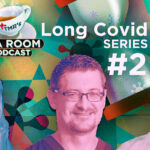Treatment is as puzzling as the syndrome. The good news is that post-viral fatigue usually resolves eventually.
Long covid was front and centre at the Australasian Covid-19 Conference in Sydney last week, where its ambiguous pathogenesis was discussed alongside the plethora of possible long covid symptoms.
Dr Ziyad Al-Aly, director of the Clinical Epidemiology at the Veteran Affairs St. Louis Health Care System, said the variety of long covid’s manifestations continued to amaze him.
“It’s a post-viral syndrome that can affect nearly every organ system: nervous system disorders, metabolic dysfunction, skin disorders, gastrointestinal, respiratory, kidney, muscular skeletal, cardiovascular,” he said.
“We also see a clear increased risk of diabetes, a remarkable increase of mental health disorders and an alarming increase of opioids and sleep medications,” he said.
Dr Al-Aly said cardiovascular issues weren’t necessarily related to prior conditions.
Finding a faint silver lining, he recommended that the scientific community take advantage of the opportunity to research post-viral syndromes.
“We didn’t think much of researching post-viral syndromes in the past 100 years and we’ve been caught a bit short,” Dr Al-Aly said.
Professor Anthony Kelleher, director of the Kirby Institute, is comparing the biological changes in people with long covid compared to those people who had an acute covid infection but had no long covid symptoms.
Professor Kelleher said that what they had found so far was an ongoing and complex activation of the immune system.
Preliminary data indicates that four months after initial infection the immune system activation is still present whether or not someone has long covid symptoms. This activation decreased over time in the control group and by eight months there were clear differentiations between the long covid group and the matched controls.
“The immune system is still producing cytokines that it normally produces early in infection against the virus,” Professor Kelleher said. “These cytokines would normally turn off within a couple of days to a couple of weeks but they’re still present post infection. And they’re particularly present in people with long covid.”
The adaptive immune response, which is usually manipulated by vaccines, was activated as well, according to Professor Kelleher.
“There is definitely an inflammatory process going on. There are clearly neurological disturbances involved, and they’re likely driven by this activation of the immune system.”
Although the preliminary data has identified biological abnormalities in long covid, the pathogenesis is still unclear and, therefore, so is a suitable treatment.
“A lot of the possible interventions that turn off the cytokines have significant side effects, which can cause generalised immunosuppression,” Professor Kelleher said.
Whether ongoing vaccinations for people with long covid will help or hinder is uncertain. In the meantime, Professor Kelleher suggested a number of things a GP could do to assist a person with long covid.
“We have to take them seriously and try and relieve their symptoms. Post-viral fatigue syndromes often take up to two years to resolve, but they do resolve. So, reassuring the patient that it is likely to resolve is helpful.
“But if it is mostly fatigue and brain fog, then make sure people take a very graduated, measured return to normality and not to try and break through the barriers,” he said.
Professor Kelleher also cautioned to check for other conditions.
“If fatigue is a symptom make sure that thyroid function tests are normal. If there is evidence of breathlessness on exertion then make sure that their cardiorespiratory status is as close to normal as it can be before you assume that long covid is the cause.”






